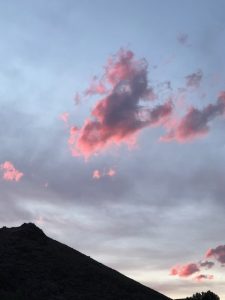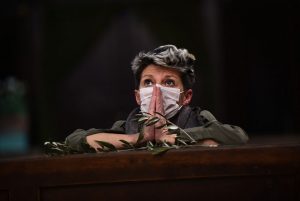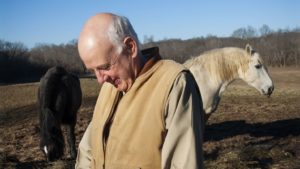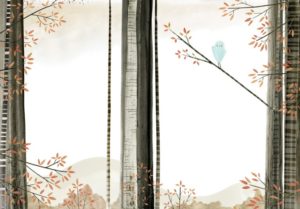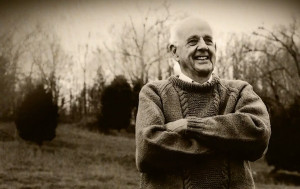Wendell Berry
grace.
June 27, 2020‘I lack the peace of simple things. I am never wholly in place. I find no peace or grace. We sell the world to buy fire, our way lighted by burning men, and that has bent my mind and made me think of darkness and wish for the dumb life of roots.’
-Wendell Berry
[Sun Valley, Idaho]
An Easter Meditation
April 12, 2020‘…resist empire with truth and love, even if it kills you.’
-Pádraig Ó Tuama, poet, theologian and mediator.
[OnBeing.org]
Principles for a Pandemic
by Sister Joan chittister
“Rules are not necessarily sacred,” Franklin Delano Roosevelt said, “principles are.”
One thing is clear: “Rules” are not getting us out of the largest pandemic in modern history.
We’re washing our hands and wearing our masks and staying indoors and counting the number of people in every group, but the numbers keep going up regardless.
At the same time, principles, if any, may be necessary but nobody talks about them much —despite the fact that it’s principles that guide our behavior or help us to evaluate what’s going on around us. Principles are the motivating force upon which everything we do is based.
The question is what kind of basic truths — principles — must drive us if we are to endure and survive the kind of despair that threatens a national moment like this one? Here we are at the touchdown point of a tornado called a pandemic. Everything about life before this has been wiped away. Worse, we have not a hint of what our world will look like in the future. Unless we define the principles we need to preserve, not only to get us through this moment but to prepare for all the great moments in times to come, this will all have been for nothing.
Becoming a spiritual person is what raises us above the angst of life. We can lose anything, let anything go, begin again after whatever tornado shreds us if we only learn to live with one part of the human heart daily invested in the presence of the divine. In that sacred space within, we seek the strength it takes to respond rightly to the pressure of such pain. We are not pleading for magic from a vending machine God to save us from its inconvenience.
We take on the challenges of the community — the masks and distancing and overtime work that’s needed — as if they were our personal responsibility alone. We check on those who are frail, who need to know they’re not alone, who are seeking services. We allow no one to be out of contact. We volunteer where we’re needed.
The principles of the holy life are obvious: it begins with a sterling spirituality, an abounding love of community and an incessant sense of personal responsibility that makes the undoable, doable always.
Until finally, it depends on following leadership that glows with goodness and vision. It is the leadership that shows us all how to be more empathic, more aware of the needs of others, more present to the demands of it all. It is the living vision of moral leadership that sends us back into the wind as long as it rages. It brings us to a greatness no circumstances can exhaust, no storm can conquer.
From where I stand, it’s not about the rules. It’s about the heart. Then we can go on, and go on, and go on. For over 1,500 years. Same rule, same principles, same gratuitous generosity of life.
A woman wearing a protective mask due to the coronavirus pandemic prays inside the Church of the Sacred Heart of Jesus on Palm Sunday, April 5 in Turin, Italy. (CNS/Reuters/Massimo Pinca)
https://www.ncronline.org/news/opinion/where-i-stand/principles-pandemic
From Journalist Bill Moyers:
‘During these trying days of social distancing, self-isolating and quarantines, days rife with fear and anxiety, my colleagues and I thought you might like some company. So each day we will be introducing you to poets we have met over the years. The only contagion they will expose you to is a measure of joy, reflection and meditation brought on by “the best words in the best order.” Enjoy.’
Today we hear from Wendell Berry as he reads “A Poem on Hope.”
“A Poem on Hope”
It is hard to have hope. It is harder as you grow old,
For hope must not depend on feeling good
And there is the dream of loneliness at absolute midnight.
You also have withdrawn belief in the present reality
Of the future, which surely will surprise us,
…And hope is harder when it cannot come by prediction
Any more than by wishing. But stop dithering.
The young ask the old to hope. What will you tell them?
Tell them at least what you say to yourself.
Because we have not made our lives to fit
Our places, the forests are ruined, the fields eroded,
The streams polluted, the mountains overturned. Hope
Then to belong to your place by your own knowledge
Of what it is that no other place is, and by
Your caring for it as you care for no other place, this
Place that you belong to though it is not yours,
For it was from the beginning and will be to the end
Belong to your place by knowledge of the others who are
Your neighbors in it: the old man, sick and poor,
Who comes like a heron to fish in the creek,
And the fish in the creek, and the heron who manlike
Fishes for the fish in the creek, and the birds who sing
In the trees in the silence of the fisherman
And the heron, and the trees that keep the land
They stand upon as we too must keep it, or die.
This knowledge cannot be taken from you by power
Or by wealth. It will stop your ears to the powerful
when they ask for your faith, and to the wealthy
when they ask for your land and your work.
Answer with knowledge of the others who are here
And how to be here with them. By this knowledge
Make the sense you need to make. By it stand
In the dignity of good sense, whatever may follow.
Speak to your fellow humans as your place
Has taught you to speak, as it has spoken to you.
Speak its dialect as your old compatriots spoke it
Before they had heard a radio. Speak
Publicly what cannot be taught or learned in public.
Listen privately, silently to the voices that rise up
From the pages of books and from your own heart.
Be still and listen to the voices that belong
To the streambanks and the trees and the open fields.
There are songs and sayings that belong to this place,
By which it speaks for itself and no other.
Found your hope, then, on the ground under your feet.
Your hope of Heaven, let it rest on the ground
Underfoot. Be it lighted by the light that falls
Freely upon it after the darkness of the nights
And the darkness of our ignorance and madness.
Let it be lighted also by the light that is within you,
Which is the light of imagination. By it you see
The likeness of people in other places to yourself
In your place. It lights invariably the need for care
Toward other people, other creatures, in other places
As you would ask them for care toward your place and you.
No place at last is better than the world. The world
Is no better than its places. Its places at last
Are no better than their people while their people
Continue in them. When the people make
Dark the light within them, the world darkens.
Wendell Berry is a man of the land and one of America’s most influential writers, whose prolific career includes more than forty books of poetry, novels, short stories and essays. Watch Bill’s full conversation with Wendell Berry.
Wendell Berry, a quiet and humble man, has become an outspoken advocate for revolution. He urges immediate action as he mourns how America has turned its back on the land and rejected Jeffersonian principles of respect for the environment and sustainable agriculture. Berry warns, “People who own the world outright for profit will have to be stopped; by influence, by power, by us.” In a rare television interview, this visionary, author, and farmer discusses a sensible, but no-compromise plan to save the Earth.
A New Urgency
October 15, 2019In a 2017 letter he wrote to the New York Review of Books, Wendell Berry called an article’s characterization of the “southernization” of rural Americans — presumably making them sexist, racist, and increasingly uneducated — as “provincial, uninformed, and irresponsible.” Instead of continuing to ignore their plight, Berry suggests, we ought to acknowledge the plundering of these rural regions by their urban neighbors. “Rural America is a colony,” Berry wrote, “and its economy is a colonial economy.”
The writer and activist Michael Pollan — who was greatly influenced by Berry — suggests that Berry remains a singular sort of truth-teller.
The 85-year-old writer doesn’t own a TV, computer, or cellphone. If you call the landline at his country home in Port Royal, you won’t reach an answering machine. When he reads this profile, it will be because someone else printed it out. And, if his general approach to life is any indication, he will probably take his time.
It’s virtually impossible to imagine life in the modern world without our technological accessories, but Berry has consistently presented this spartan circumstance as a compelling proposition: An unplugged life, rooted in nature, he has argued, is the key to fulfillment.
He has insisted on individual responsibility: Indeed, Berry contends climate change advocates don’t go far enough and that “the origin of climate change is human laziness” — a view now widely adopted by those who would ban straws and limit their air travel.
If you ask the average person in Kentucky what he or she knows about Berry, those who have heard of him will tell you he’s a poet, or novelist, activist, environmentalist, or farmer. The truth is that Berry is a Renaissance man, skilled at all of it.
Bill McKibben’s environmental activism was spurred after his wife gave him a copy of Berry’s 1979 essay collection Home Economics, which offered ideas on how we can live a simple and grounded life at home. “There’s no writer working in the English language I admire as much,” McKibben says.
For the author Barbara Kingsolver, he’s something more: A fellow Kentuckian whose writings she turned to, she wrote in an email, “after I left home and learned with a shock that the outside world looks down on us.
“Decade after decade, I keep running up against the bigotry of American mainstream culture against Appalachians, farmers, and rural life, and I always come back to Wendell for solace,” she wrote. “Quietly and without bitterness he brings me home to myself, reminding me that all the ‘hillbilly elegies’ in the world can’t touch the strength of our souls or the poetry of our language.”
Wendell Berry
August 6, 2017[Illustration: Vern Kousky, The Blue Songbird]
“The Peace Of Wild Things”
When despair for the world grows in me
and I wake in the night at the least sound
in fear of what my life and my children’s lives may be,
I go and lie down where the wood drake
rests in his beauty on the water, and the great heron feeds.
I come into the peace of wild things
who do not tax their lives with forethought
of grief. I come into the presence of still water.
And I feel above me the day-blind stars
waiting with their light. For a time
I rest in the grace of the world, and am free.
Wendell Berry ~ How to Be a Poet
May 19, 2015
“When power corrupts, poetry cleanses,” John F. Kennedy proclaimed in his touching tribute to Robert Frost, celebrating poetry as “the means of saving power from itself.”
(Brainpickings)
http://www.brainpickings.org/2015/05/12/how-to-be-a-poet-wendell-berry/
